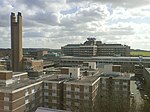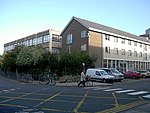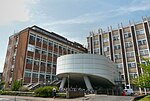Cambridge Biomedical Campus

The Cambridge Biomedical Campus is the largest centre of medical research and health science in Europe. The site is located at the southern end of Hills Road in Cambridge, England. Over 20,000 people work at the site, which is home to Cambridge University Hospitals NHS Foundation Trust, Royal Papworth Hospital NHS Foundation Trust, AstraZeneca's headquarters, Abcam, the Wellcome Trust, Cancer Research UK, the University of Cambridge's medical school, and the United Kingdom's governmental Medical Research Council, which has National Institute for Health and Care Research-designated biomedical research centre status. Cambridge Biomedical Campus is an accredited UK academic health and science centre.
Excerpt from the Wikipedia article Cambridge Biomedical Campus (License: CC BY-SA 3.0, Authors, Images).Cambridge Biomedical Campus
Stansgate Avenue, Cambridge
Geographical coordinates (GPS) Address External links Nearby Places Show on map
Geographical coordinates (GPS)
| Latitude | Longitude |
|---|---|
| N 52.176 ° | E 0.14 ° |
Address
Cambridge Biomedical Campus (Addenbrooke's)
Stansgate Avenue
CB2 0QZ Cambridge
England, United Kingdom
Open on Google Maps









